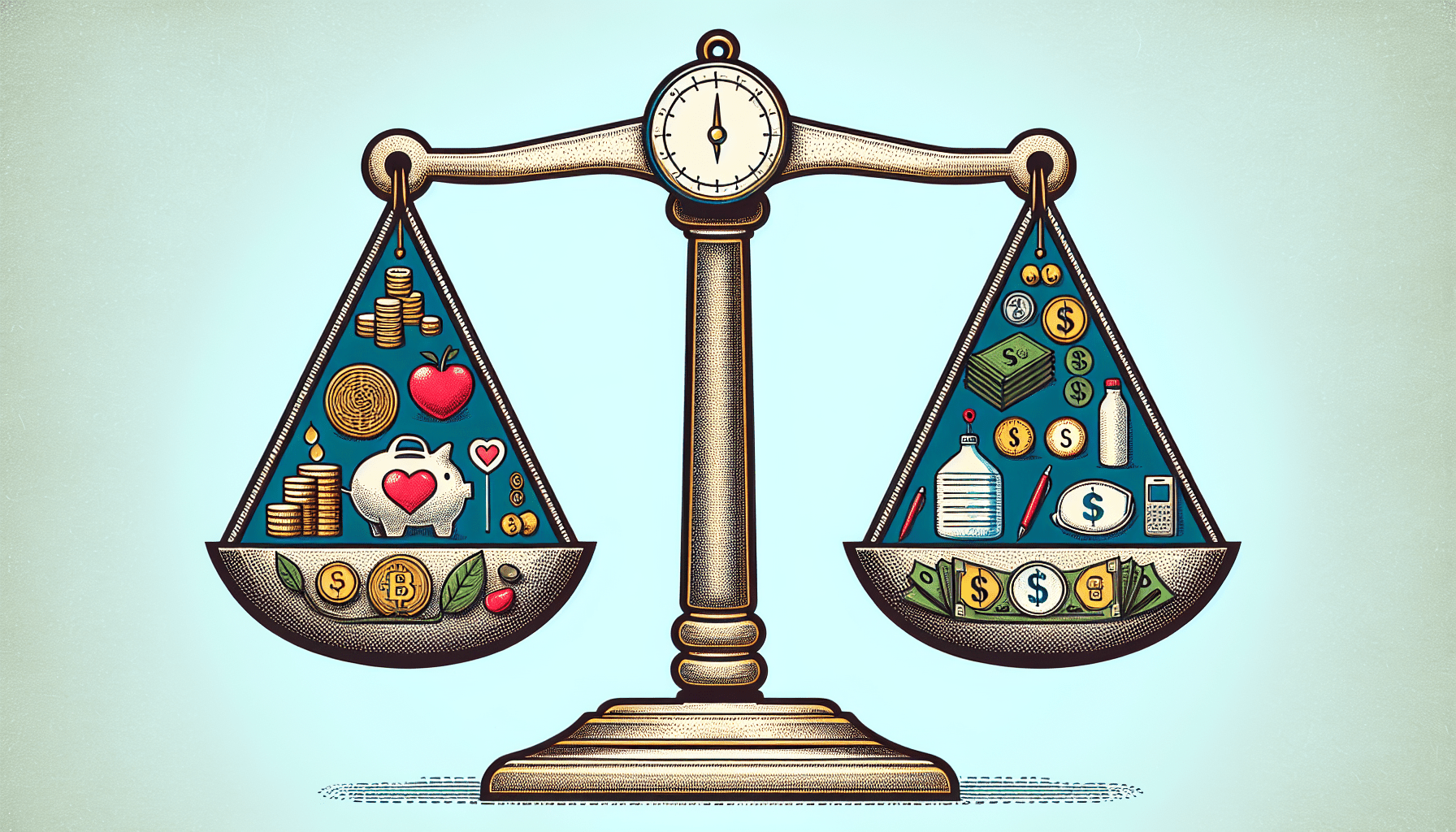Finding Financial Balance: Introduction
Finding financial balance is crucial for maintaining overall wellness in your life. It’s not just about making money and saving it – it’s about managing your finances in a way that supports your mental, emotional, and physical well-being. In this article, we will explore the art of balance when it comes to your finances and how you can achieve holistic financial wellness.

Understanding Holistic Financial Wellness
Holistic financial wellness goes beyond simply managing your money. It involves looking at all aspects of your financial life, including budgeting, saving, investing, and planning for the future. By taking a holistic approach to your finances, you can ensure that you are not only meeting your immediate financial needs but also setting yourself up for long-term success.
Budgeting: The Foundation of Financial Wellness
Creating a budget is the first step towards achieving financial balance. A budget helps you track your income and expenses, allowing you to see where your money is going and make adjustments as needed. By creating a budget and sticking to it, you can avoid overspending, save money for the future, and reduce financial stress.
Saving: Building a Financial Safety Net
Saving money is essential for achieving financial wellness. By setting aside a portion of your income each month, you can build a financial safety net to fall back on in times of need. Whether it’s an emergency fund, a retirement account, or a savings goal, saving money allows you to plan for the unexpected and work towards your long-term financial goals.
Investing: Growing Your Wealth
Investing is a powerful way to grow your wealth and achieve financial independence. By putting your money to work in the stock market, real estate, or other investment vehicles, you can earn a return on your money and build wealth over time. Investing requires patience, research, and a long-term perspective, but it can be a great way to achieve your financial goals and secure your financial future.
Achieving Work-Life Balance
Achieving work-life balance is essential for maintaining holistic financial wellness. Balancing your work responsibilities with your personal life can help reduce stress, improve your mental health, and promote overall well-being. By finding the right balance between work and leisure, you can ensure that your financial success doesn’t come at the expense of your happiness and health.
Setting Boundaries: Prioritizing Self-Care
Setting boundaries is crucial for achieving work-life balance. Whether it’s setting limits on your work hours, taking time off when needed, or prioritizing self-care activities, establishing boundaries can help you maintain a healthy balance between your work and personal life. By making self-care a priority, you can recharge your batteries, reduce stress, and improve your overall well-being.
Time Management: Maximizing Productivity
Effective time management is key to achieving work-life balance. By prioritizing your tasks, setting realistic goals, and avoiding distractions, you can make the most of your time and achieve greater productivity in both your work and personal life. By managing your time effectively, you can create more time for the things that matter most to you, whether it’s spending time with loved ones, pursuing hobbies, or taking care of yourself.
Stress Management: Finding Peace of Mind
Managing stress is essential for maintaining holistic financial wellness. High levels of stress can have a negative impact on your physical and mental health, as well as your financial well-being. By finding healthy ways to manage stress, such as meditation, exercise, or therapy, you can reduce stress levels, improve your overall well-being, and achieve a greater sense of balance in your life.

Nurturing Relationships: The Key to Happiness
Building and maintaining healthy relationships is essential for achieving holistic financial wellness. Strong social connections can provide support, encouragement, and a sense of belonging, all of which are crucial for your overall well-being. By nurturing your relationships with family, friends, and colleagues, you can create a strong support system that can help you navigate life’s challenges and achieve greater happiness and fulfillment.
Communication: Building Strong Connections
Effective communication is key to building strong relationships. By listening actively, expressing your thoughts and feelings openly, and practicing empathy, you can strengthen your connections with others and build trust and understanding. Good communication skills can help you resolve conflicts, navigate difficult situations, and build deeper, more meaningful relationships with those around you.
Quality Time: Making Memories Together
Spending quality time with loved ones is essential for nurturing relationships. Whether it’s enjoying a meal together, going for a walk, or simply catching up over the phone, making time for the people you care about can help strengthen your bonds and create lasting memories. By prioritizing quality time with family and friends, you can foster deeper connections, improve your emotional well-being, and experience greater happiness in your life.
Support System: Lean on Others
Having a strong support system is crucial for maintaining holistic financial wellness. Whether it’s a friend, family member, or colleague, having someone to turn to in times of need can provide emotional support, practical advice, and a listening ear. By leaning on others for support, you can navigate life’s challenges with greater ease, reduce stress, and improve your overall well-being.
Planning for the Future: Setting Financial Goals
Setting financial goals is essential for achieving holistic financial wellness. By defining your financial objectives, creating a roadmap to achieve them, and monitoring your progress along the way, you can ensure that you are on track to meet your goals and secure your financial future. Whether it’s buying a home, starting a business, or saving for retirement, setting financial goals can help you stay motivated, focused, and disciplined in your financial journey.
SMART Goals: Specific, Measurable, Achievable
When setting financial goals, it’s important to make them SMART: specific, measurable, achievable, relevant, and time-bound. By clearly defining your goals, breaking them down into smaller tasks, and setting deadlines for completion, you can make your goals more manageable and increase your chances of success. Whether it’s paying off debt, saving for a vacation, or investing in your future, setting SMART goals can help you stay focused and track your progress effectively.
Financial Planning: Creating a Roadmap
Financial planning is essential for achieving your financial goals. By creating a comprehensive financial plan that outlines your income, expenses, assets, liabilities, and goals, you can get a clear picture of your financial situation and make informed decisions about your money. A financial plan can help you identify areas for improvement, set priorities, and create a roadmap to achieve your goals over time.
Monitoring and Adjusting: Staying on Track
Monitoring your progress and adjusting your financial plan as needed is crucial for achieving your goals. By regularly reviewing your finances, tracking your spending, and evaluating your progress towards your goals, you can stay on track and make adjustments as needed. Whether it’s cutting expenses, increasing your savings rate, or reallocating your investments, monitoring and adjusting your financial plan can help you stay focused and make progress towards your goals.
Conclusion
Achieving holistic financial wellness requires a balanced approach to managing your money, work-life balance, relationships, and future planning. By taking steps to create a solid financial foundation, nurture healthy relationships, and set clear financial goals, you can achieve greater peace of mind, happiness, and fulfillment in your life. Remember, it’s not about perfection but progress – every small step you take towards achieving financial balance brings you closer to holistic financial wellness. Start today by taking the first step towards a more balanced and fulfilling financial life.

